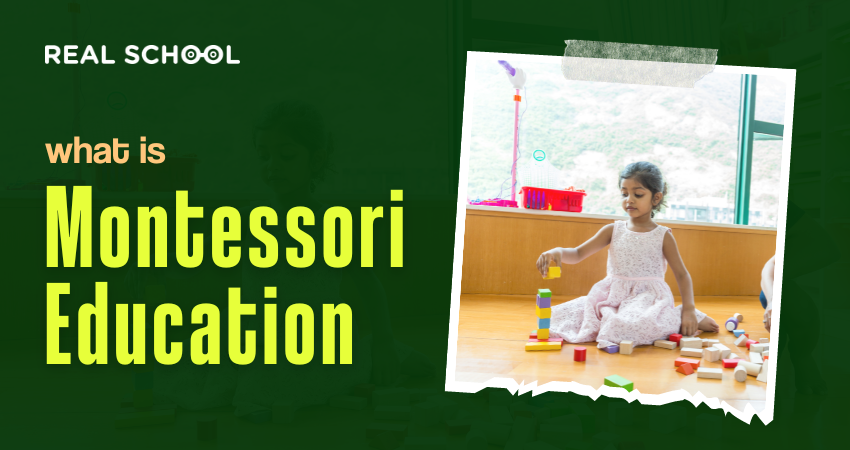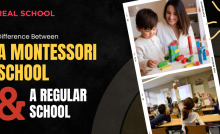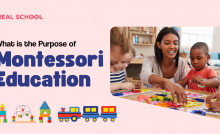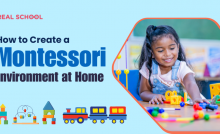What is Montessori Education?


Montessori education, a unique and holistic approach to learning, has been transforming the lives of children for over a century. Developed by Dr. Maria Montessori, an Italian physician and educator, this educational philosophy places the child at the center of their learning journey. By fostering independence, self-directed learning, and a deep respect for each individual’s potential, Montessori education creates an environment where children flourish academically, emotionally, and socially. In this article, we will delve into the core principles of Montessori education, the impact it has on students, and its relevance in today’s educational landscape.
Origins and Founder:
Montessori education traces its roots back to the early 20th century when Dr. Maria Montessori observed the innate curiosity and natural desire to learn in young children. She developed a pedagogical approach that honored and nurtured these qualities. Dr. Montessori’s background in medicine and her observations of children’s behavior led her to create an educational model that focused on individualized learning, hands-on experiences, and a prepared environment.
Core Principles of Montessori Education:
Central to Montessori education are its core principles that guide the teaching and learning process. A child-centered approach forms the foundation, emphasizing that children are active participants in their own education. The prepared environment is meticulously designed to provide a wide range of materials and activities that cater to different learning styles and developmental stages. This environment encourages exploration, discovery, and critical thinking. Hands-on learning is a cornerstone of Montessori education, enabling students to engage their senses and actively construct their knowledge.
Also Read: Montessori for Children with Special Needs: The Right School for Education
Montessori Classroom Setup:
The Montessori classroom, often referred to as a “prepared environment,” is carefully arranged to facilitate independent learning. Materials are displayed on accessible shelves, inviting students to choose activities that capture their interest. The role of the Montessori teacher is that of a guide who observes, assesses, and supports each student’s progress. This setup fosters a sense of ownership, responsibility, and agency among learners.
Role of the Teacher:
The Montessori teacher’s role is a departure from traditional teaching methods. Educators are trained to observe students closely, identifying their interests and strengths. This individualized attention allows teachers to tailor their instruction and provide personalized guidance. Instead of delivering lectures, Montessori teachers facilitate learning experiences, allowing students to explore topics at their own pace. This shift in role empowers students to become active seekers of knowledge.
Montessori Materials:
Montessori materials are meticulously crafted to support the developmental needs of children. These materials are designed to be self-correcting, allowing students to learn from their mistakes and develop problem-solving skills independently. Each material isolates a specific concept, encouraging focused exploration and a deep understanding of fundamental concepts such as mathematics, language, and sensorial experiences.
Emphasis on Independence:
Independence is a fundamental value in Montessori education. By giving students the autonomy to choose their activities, set their learning goals, and work at their own pace, educators cultivate a sense of self-confidence and intrinsic motivation. Practical life activities, such as pouring, sweeping, and dressing, further reinforce independence and life skills.
Holistic Development:
Montessori education places equal importance on academic and non-academic growth. Emotional intelligence, social skills, and character development are integral components of the curriculum. Students learn to communicate effectively, resolve conflicts peacefully, and develop empathy for others. This holistic approach prepares students not only for academic success but also for a fulfilling and meaningful life.
Freedom of Choice and Self-Directed Learning:
One of the hallmarks of Montessori education is the freedom of choice. Students are encouraged to follow their interests and passions, leading to a deep engagement with their learning. This self-directed approach instills a lifelong love for learning, as students discover the joy of exploring subjects that resonate with them.
Assessments and Evaluation:
Montessori education diverges from traditional grading systems. Instead of focusing on external rewards or punishments, assessments in Montessori classrooms are rooted in observation and documentation. Teachers observe students’ progress, interests, and challenges, creating a comprehensive picture of their development. This approach fosters a growth mindset and a genuine love for learning rather than a fixation on grades.
Montessori Education Beyond Preschool:
While Montessori education is often associated with preschool, its principles are applicable to various age groups. Montessori elementary and secondary education adapts the approach to accommodate more advanced concepts. The emphasis on self-directed learning, individualized instruction, and experiential learning continues to guide students as they progress through different stages of education.
Also Read: Why Montessori Schools Are Ideal for Early Childhood Education
Challenges and Misconceptions:
Implementing Montessori education comes with its challenges and misconceptions. Critics sometimes question the effectiveness of the approach, misunderstanding its focus on freedom as a lack of structure. Educators, however, understand that this freedom is carefully balanced with a well-prepared environment and skilled guidance, ensuring optimal learning outcomes.
Montessori Education and the Future:
In a rapidly changing world, the principles of Montessori education remain relevant and forward-thinking. The emphasis on critical thinking, problem-solving, and adaptability equips students with the skills needed to thrive in the 21st century. As educators and parents seek innovative and effective educational models, Montessori education offers a time-tested approach that continues to empower generations of learners.
Conclusion:
Montessori education’s enduring impact on students’ lives is a testament to its effectiveness. By fostering independence, self-directed learning, and holistic development, this approach creates confident, curious, and compassionate individuals. Book a Free Class Here – The Real School
Recent Posts
What are the Advantages of Online Teaching at The Real School?
In the article -"What are the Advantages of Online Teaching at The Real School?" we…
What is the Full Form of School?: Unveiling the Acronym
The term "school" carries profound significance in the realm of education, representing more than just…
What is Math Full Form?: Cracking the Code
Mathematics, often referred to as "Math," is a subject that elicits various reactions from students…
What is Full Form of Homework?: Decoding Academics
Homework, an integral part of the academic journey, often raises questions about its purpose and…
What is Full Form of Teacher?: Demystifying Education
In the intricate tapestry of education, teachers stand as the pillars shaping the intellectual and…
What is Real Education?: Discovering Its Essence and Impact
The concept of real education is evolving, transcending traditional views that equate it solely with…



